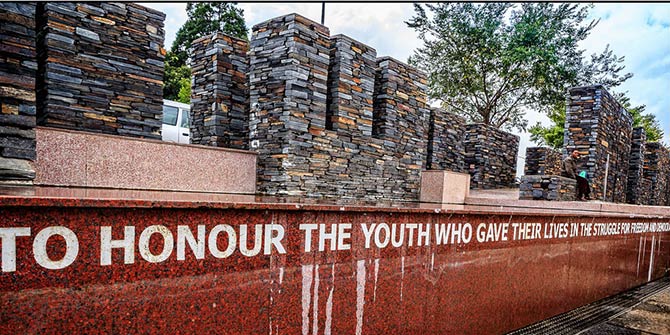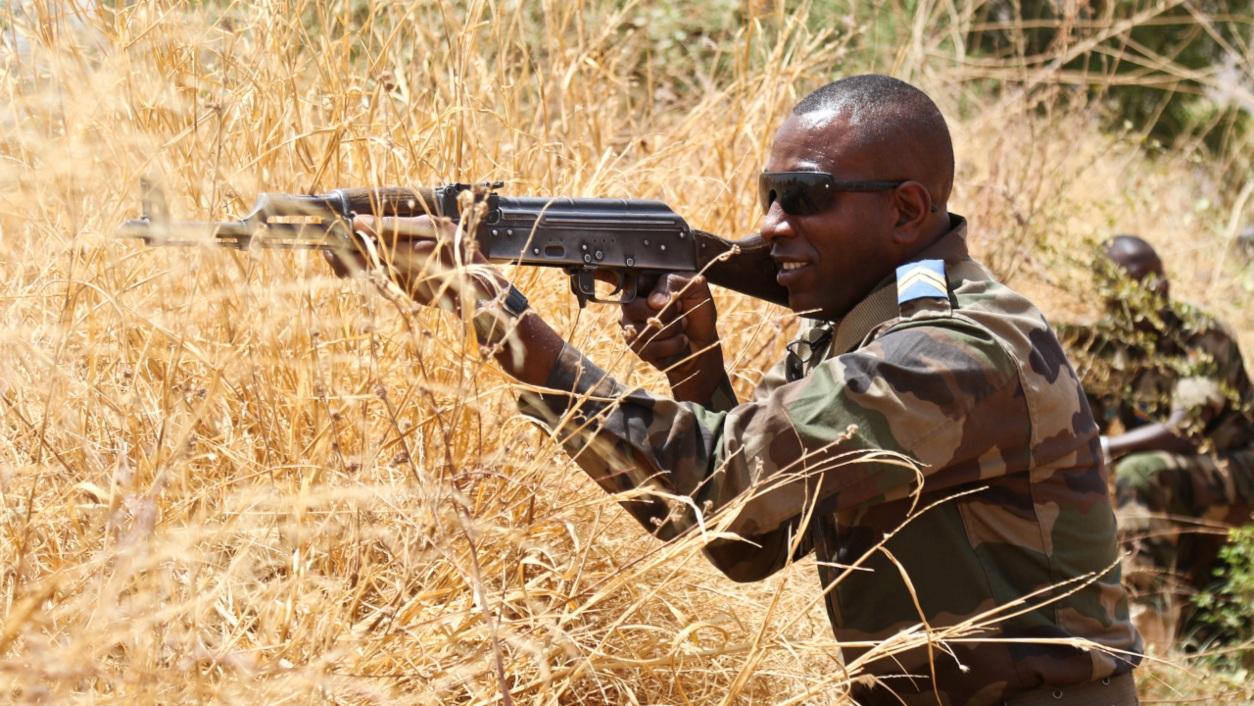LSE’s Omar McDoom assesses the fairness of the criticisms of the Kony 2012 campaign.
Kony 2012 is a short video made by Invisible Children, an organisation founded by a group of young American activists, that calls on people to demand the capture of the leader of the Lord’s Resistance Army, a rebel group originating in northern Uganda that has committed numerous atrocities against civilians.

Having finally watched Kony2012 myself last night, I then started to digest the myriad responses it has attracted. I thought I would try to assess how fair some of these criticisms are, in my view at least.
1. It simplifies the complexity of northern Uganda and the conflict: Yes, it does. Enormously. The video is ahistorical and does not consider the origins of the conflict or the role of the Ugandan government and army in it. The historical neglect of northern Uganda and political marginalisation of the Acholi, among other groups, go unmentioned. The video then could better educate its audience and appeal more to reason than to emotion. Yet I think it unfair to view Kony2012 as a documentary or as a news reportage. I see it rather as a novel and extended campaign “advertisement”. Its purpose was to focus attention more than teach history. The fact that I’m writing this and that you’re reading it is evidence of its effectiveness in this regard. It started a debate. Moreover, much of the missing contextual information is easily found, and a little in fact at www.kony2012.com.
2. It advocates a military over a peaceful solution: The externally-mediated peace process in Juba, Sudan collapsed in 2008. And, whether you agree with its wisdom or not, an ICC arrest warrant remains open for Kony. He cited its existence as a major concern for him in the negotiations. I think it would be difficult at this stage to make any credible promise to Kony that would reassure him of immunity from prosecution in the Hague. I’m not even certain this is a promise that should be considered. I can see the merit of forgiveness and reconciliation for the rank-and-file, certainly for those abducted as children. But regarding the LRA leadership – justice, the rule of law, and the views of victims are not interests to be lightly sacrificed. Demanding peace negotiations may also implicitly legitimise Kony as the person to speak on behalf of northern Ugandans, even though they have been the principal victims of his campaign. If you want a peace process, there are better-qualified representatives to sit down at a negotiating table and speak to the region’s longstanding grievances than Kony. His self-interested concern for his survival has proven him a spoiler of the process and you would be giving him a disproportionately-sized role. Finally, the duration of peace following negotiated settlements is not certain and has been shown empirically to be short-lived.
3. Using violence to counter violence will cost more civilian lives: IC is accused of naivety as to the consequences of hunting Kony. However, as I understood it, it is not calling for “war”, but for the arrest of an individual. Military specialists on the ground can better debate the various ways this could be achieved. It might be done for example using small, highly mobile units and technology rather than a crude war of attrition. It might also be done by targeting the LRA leadership and offering amnesty and other incentives for the rank-and-file to defect and turn in Kony. Let’s also not forget that the LRA has operated for some 25 years with near impunity and has already taken many thousands of lives. It is not so glaringly obvious to me that action to arrest Kony will cost more lives than indefinite inaction in the long run. But it seems to me that the point should at least be debatable.
4. It demonises Kony and ignores the Ugandan army’s actions : The video is indeed silent on accusations levelled against the Ugandan army (UPDF) for human rights abuses. This imbalance is a fair criticism, though it would be wrong to imply the LRA and UPDF are morally equivalent. There is also a valid concern that the US would be arming and training the very army whom some in northern Uganda view as part of the problem, both historically and today. It seems reasonable to ask then that US military assistance also include human rights training for the UPDF to help it become a more modern, professional army.
5. It suggests Kony’s arrest will solve the problem: It is reasonable to ask if the LRA would be affected if deprived of Kony’s leadership. Personally, I think so. Joseph Kony retains some operational control of the LRA and the ICC arrest warrant is premised on a belief in his command responsibility. He has also built and relies on a cult of personality to lead the LRA. His capture would belie the myth of his invincibility. Obviously, this will not immediately solve the problem of northern Uganda’s underdevelopment. But the IC campaign is aimed at ending the insecurity and atrocities against civilians – inside and outside Uganda. Kony’s arrest might possibly achieve this.
6. It implies only white Americans can save black Africans: I’m not sure I understand what underlies this criticism. Is it the idea of a “saviour”? Is it the foreign identity of a saviour? Or is it the colour of the saviour? Perhaps all of these things. Yet the US and others are also criticised for failing to save civilian lives elsewhere on the continent. In Rwanda and Darfur for example. It seems odd to expect help in one situation, but to criticise its offer in another. In any case, IC is not claiming it can “save” northern Uganda. As I understood the end of the video, it is trying to mobilise public opinion to sustain the political will in Washington to keep 100 military advisers in Uganda to help capture Kony. This seems a discrete, achievable objective to me, not the imposition of an unwanted saviour.
7. A small portion of IC’s money reaches Uganda: I don’t believe IC claims to be solely or even primarily an organisation that provides humanitarian or development services. It does claim to be an advocacy outfit. Obviously advocacy is important to mobilise funds for the work that is needed on the ground. Moreover, this is not a case of deception. IC has published its financial statements at www.kony2012.com and the transparency helps potential donors make the choice of whether to contribute or not.
8. It eclipses local organisations and efforts on the ground: The effectiveness of Invisible Children is that it is international and that it has the power to influence politics and public opinion outside Uganda. If external resources can be mobilised, then local efforts may ultimately benefit. It seems odd to me to think of IC as a rival or competitor with local actors.
9. Kony2012 provide an out-of-date view on the war: The security situation in northern Uganda has indeed significantly improved. IC explicitly acknowledges this. The LRA has been pushed outside of Uganda and people have left the IDP camps and returned to their villages. The challenge is primarily now one of reconstruction for northern Uganda. However, the insecurity persists for civilians who live in CAR, South Sudan, and eastern DRC, and as long as the LRA continues to operate, the threat also remains in its homeland of northern Uganda too. It seems right to me to be equally concerned for civilians who live outside Uganda and who are at risk of attack by the LRA.
10. It gives IC’s leadership celebrity status: Jason Russell, and his young son, are indeed central to the story. At first, I thought this odd as well. Upon reflection though, I think it helped reduce the distance between viewer and subject. It was a novel narrative device to draw in a mainly young audience otherwise desensitised to and fatigued by stories of suffering and wrongdoing in Africa.
Probably there are other criticisms that I’ve not addressed here. On balance though, I think Invisible Children’s campaign will do more good than harm and critics should be fairer in their judgement. Experts on Uganda might consider offering their advice to IC’s leadership, rather than using their knowledge to delegitimise it publicly. Channel constructively the energy in young people that IC taps and perhaps it will become a stronger movement for it. After all, IC’s advocates and critics do share one thing: a concern for Uganda. Build from this.
Finally, I should say I co-direct a non-profit organisation that does work with children directly affected by the conflict on the ground in northern Uganda (though the views here are my own). We do leadership development and are training them to become the next generation of community leaders to rebuild the north. Almost 100% of our funds go directly to Uganda. www.thechildisinnocent.org. We’re much smaller than IC and much less well-known. But I for one am personally grateful for the attention they’ve brought to the region and the debate they have stimulated.
This post was written on 15 March 2012.






I certainly do agree with you that the video oversimplifies the situation and the war. However I find your comment about “the historical neglect of northern Uganda and political marginalisation of the Acholi,..” to be erroneous. No doubt it was a ravaged land, the toll the LRA exacted on the Acholi is immeasurable; but the Ugandan people are united in their firm belief that everything necessary should be done to aid rehabilitation in this area. Reconstruction is taking place at a brisk rate, the Ugandans in that region are racing full steam ahead and the successful implementation of the Northern Uganda Social Action Fund is showing great results. I don’t believe it is factually correct to call the vagaries of war ‘marginalisation’.
The Stop Kony 2012 video is undoubtedly a pop snap shot of a very, very difficult situation. It represents suffering but not reality, it represents good will but not effective plans for change. Hon. Mbabazi put it best when he said http://goo.gl/uowwB. Granted this video is not slick. But given a choice I would choose substance over style any day. I wish the IC and all their ‘activists for awareness’ could know this about our country; first that every corner of Uganda is peaceful, and that there are real heroes, Ugandans infact, out there hunting for KONY and are determined to arrest him for his crimes.
Kony says he didnt do it:-